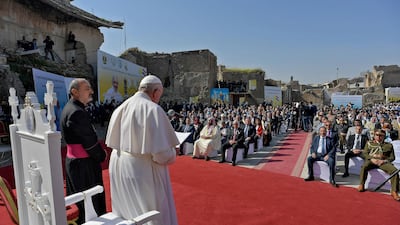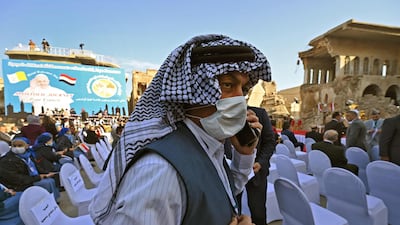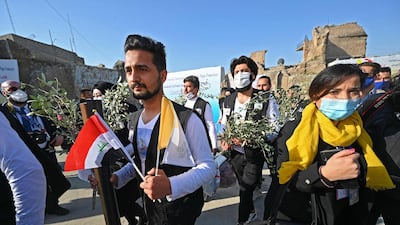After ISIS seized his home city in 2014, Omar Qais spent 33 months working on sculptures in the basement of his home.
On the streets above him, the terrorist group was busy destroying Mosul's identity, history and heritage.
So it was a glorious day when Qais became the first Muslim in the war-torn city to present a gift – a handmade cross – to Pope Francis when he held a prayer for victims of war last Sunday.
The sculptor said it was part of his initiative to show Mosul's true identity – of peace and coexistence.
"I made the cross to portray the fact that Moslawis have no issues with anyone, regardless of their religion, cultural and ethnic affiliation, we all want to live in peace," Qais told The National.

“I don’t even know what religion my neighbour is, we are all Iraqis. This is evident in what I did, I’m not a Christian yet I made a cross for Pope Francis on behalf of Moslawis,” he said.
A sculpture of a white dove is on top of the cross while two hands, representing Mosul's men and women, form the base of the Christian symbol.
He managed to complete the sculpture in a week, although some of its parts were made during the time that Qais was trapped under ISIS occupation.
Mosul, Iraq’s second largest city, where ISIS’s so-called caliphate was announced, was controlled by the insurgents for three years.
Pope Francis stood amid the rubble left behind by ISIS in Mosul and declared hope to be "more powerful than hatred and peace more powerful than war".
The pontiff called for the "harmonious coexistence" of people from different backgrounds and cultures, while leading a prayer at the church square overlooking the ruins of Al Tahera Church in Mosul's Old City.
Qais said he was relieved that Pope Francis managed to see the destruction that war left behind in Mosul's centre.
"We didn’t want him to visit an area that is cleared of the rubble and one that doesn’t show the pain and agony that we all went through," he said.
The Iraqi artist said the country's problems were not based on religious differences but politics.
"The cross portrays the love and appreciation we have towards our Christian brothers, to tell them whoever wants to return home is most welcome," Qais said.
Pope Francis's visit aimed to show solidarity with the country’s remaining Christians, whose numbers have shrunk to less than one third of the 1.5 million who lived there before the 2003 US-led invasion.
The exodus of Christians increased after ISIS made gains in 2014.
Shortly after his speech in Mosul, Pope Francis awarded Qais, who was standing on the podium, a bronze medallion for his efforts.
“I was extremely happy to have met him, I had no idea that he would give me a present,” he said. "I opened the box to see a bronze medallion that has a map of Iraq and has the Prophet Abraham and the city of Ur."

The Pope's visit to Mosul sends a message that war does not bring anything but destruction, death and misery, Qais said.
“Pope Francis is a messenger of peace and we, the people of Mosul, love peace and to interact with those who promote this,” he said.



























